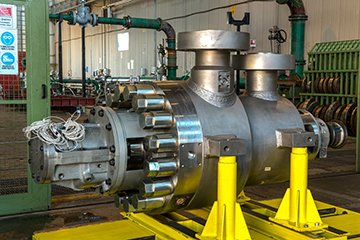Introduction: The Strategic Importance of Maintenance in MENA Oilfields
The MENA region remains a cornerstone of global oil and gas production. From Libya’s mature fields to the vast offshore platforms in the Gulf, maintaining high operational uptime is not only a technical necessity but a commercial imperative. Oilfield maintenance services have evolved into one of the most strategic disciplines in sustaining production capacity and ensuring long-term profitability.
Harsh Operating Conditions Demand Technical Precision
Oilfields across the Middle East and North Africa face extreme environmental and operational challenges. High desert temperatures, offshore exposure, corrosive atmospheres, and aging assets continuously stress rotating equipment such as gas turbines, compressors, and pumps. Even minor faults can quickly escalate into shutdowns that jeopardize production, safety, and regulatory compliance.
Moving from Reactive to Predictive Maintenance
Traditional maintenance models in the region often relied on reactive interventions, responding only after failures occurred. Today, leading operators are transitioning to predictive maintenance strategies, leveraging real-time data and condition monitoring technologies. Predictive models allow operators to detect early indicators of mechanical wear, misalignment, or component stress, scheduling interventions only when required and minimizing unnecessary downtime.

The Role of Preventive and Predictive Maintenance
Preventive maintenance schedules remain a cornerstone of many programs, involving planned inspections, routine servicing, and component replacements according to predefined intervals. Predictive maintenance builds on this foundation, integrating advanced diagnostics such as vibration analysis, thermal imaging, SCADA integration, IIoT sensor networks, and AI-powered forecasting models. These technologies are especially valuable for managing the health of critical rotating equipment central to oil and gas operations.
Certified Field Services: The Backbone of Reliable Operations
Effective oilfield maintenance in MENA depends on highly skilled field service teams capable of executing complex repairs and diagnostics on-site. Certified engineers across mechanical, electrical, instrumentation, and control disciplines are essential for both planned shutdowns and rapid-response troubleshooting. Given the remote and offshore nature of many oilfields, the ability to deploy qualified personnel quickly often determines whether small faults are contained or escalate into full-scale outages.
Developing National Technical Capacity
Across the MENA region, national oil companies are heavily investing in the development of local technical expertise. Certification programs, technical training, and OEM partnerships ensure that maintenance personnel are fully qualified to maintain assets according to global standards. This focus not only builds resilience into national energy sectors but supports regional workforce development goals that align with long-term economic diversification strategies.
OEM Partnerships Ensure Maintenance Standards
OEM-aligned maintenance remains critical in preserving equipment warranties, ensuring compatibility of spare parts, and maintaining adherence to technical specifications. Partnerships with global technology providers such as Baker Hughes, Nuovo Pignone, Citic Steel, and PALL allow regional service providers to access certified components, proprietary diagnostics, and continuous technical support. This ensures that complex machinery, particularly gas turbines and compressors, are maintained at optimal performance levels throughout their lifecycle.
Digital Transformation is Redefining Maintenance in MENA
The integration of digital technologies is rapidly changing how maintenance is executed. SCADA systems, IIoT platforms, and cloud-based analytics provide continuous visibility into asset performance. AI-powered predictive maintenance systems are increasingly able to analyze historical and live data, building models that forecast failures with precision. As these systems mature, they not only improve asset reliability but optimize inventory management, labor allocation, and operational planning.
The Case of Libya: Stability Through Maintenance Excellence
In Libya, where oil production is recovering from years of operational disruption, maintenance services are playing a central role in securing output stability. Both mature and newer installations require robust maintenance strategies that combine traditional field expertise with emerging digital tools. Companies like PetroGas Libya contribute to this national effort, delivering predictive maintenance, major overhauls, condition monitoring, and long-term maintenance agreements that ensure critical assets operate efficiently under demanding conditions.
Conclusion: Maintenance Excellence Secures Long-Term Competitiveness
Oilfield maintenance is no longer a supporting function, it is central to operational strategy. In a region where oil production is both a national economic driver and a global energy necessity, investing in integrated, data-driven maintenance solutions offers operators the greatest control over operational stability. As the MENA energy sector faces growing regulatory, commercial, and environmental pressures, those companies that prioritize advanced maintenance today will secure both production reliability and long-term competitiveness in an evolving global energy market

